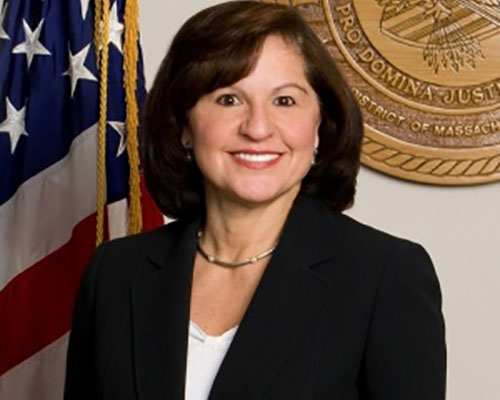U.S. Attorney Carmen M. Ortiz.
A real estate attorney pleaded guilty this week to participating in a far-reaching scheme to defraud banks and mortgage companies as part of a conspiracy involving sham “short” sales of numerous residential properties in in Haverhill, Lawrence and Methuen.
Hyacinth Bellerose, 50, of Dunstable, Mass., pleaded guilty to one count of conspiracy to commit bank fraud. U.S. District Court Judge Rya W. Zobel scheduled sentencing for Feb. 4, 2016.
Bellerose colluded with others – including a Methuen loan officer and a Haverhill real estate agent who were not identified – to defraud various banks through the use of bogus short sales of homes. A short sale is a sale of real estate for less than the value of any mortgage debt on the property. Short sales are an alternative to foreclosure that typically occur only with the consent of the mortgage lender, and that generally result in the lender absorbing a loss on the loan and releasing the borrower from the unpaid balance. By nature, short sales are intended to be arms-length transactions in which the buyers and sellers are unrelated, and in which the sellers cede their control of the subject properties in exchange for the short-selling bank’s agreement to release them from their unpaid debt. In this case, Bellerose colluded with others to feign a short sale and thereby defraud banks of the full value of the mortgage, according to the U.S. Attorney’s office, Boston.
The conspiracy began in approximately August, 2007, and continued through June, 2010, a period that included the height of the financial crisis and its aftermath. Home values in Massachusetts and across the nation declined precipitously, and many homeowners found themselves suddenly “underwater,” with their homes worth less than the mortgage debt they owed. As part of the scheme, Bellerose and her co-conspirators submitted materially false and misleading documents to numerous banks in an effort to induce them to permit the short-sales – and thereby to release the purported sellers from their unpaid mortgage debts – while simultaneously inducing the purported buyers’ banks to provide financing for the deals. In fact, the purported sellers simply stayed in the homes with their debt substantially reduced while Bellerose and others made money from the transactions fees associated with the fake sales. In some cases, the conspirators then re-sold the properties in genuine arms-length transactions for a profit.
As part of the conspiracy, conspirators submitted phony earnings statements in support of numerous loan applications that they submitted to banks on behalf of purported buyers, in order to obtain financing for the purported sales. They also submitted phony settlement statements to banks, as well as to the Federal Housing Administration, that did not accurately reflect the disbursement of funds in the transactions. For example, in one transaction described by the U.S. Attorney’s office, the unnamed loan officer and the loan officer’s spouse signed two purchase and sale agreements, dated five days apart, in which they purported to agree to the sale of their Methuen home to a third party. In the first agreement, they purported to sell the property for $299,000. In the second, they purported to sell the property for $289,000.
The first agreement was provided to Chase Home Finance LLC, a subsidiary of J.P. Morgan Chase Bank, N.A., which held the first mortgage on the home, and also affirmed that they were unrelated and that there was no agreement that would allow the sellers to remain in the property after the sale. In fact, the purported buyer was the mother of one of the purported sellers, who intended to remain in the property after the purported sale.
To facilitate the transaction, the conspirators submitted to Bank of America a loan application on behalf of the purported buyer that falsely represented her employment status, and was accompanied by phony earnings statements. The conspirators also submitted to Bank of America the second purchase and sale agreement, reflecting the higher purported sale price of $299,000.
In connection with the purported sale, Bellerose prepared two settlement statements. One S was provided to Chase as the short-selling bank, and reflected a purported sale price of $289,000, and a purported buyer deposit of $15,216. The other statement, provided to Bank of America and FHA, reflected a purported sale price of $299,000, and a purported buyer deposit of $14,916. In fact, the purported buyer did not make any down payment toward the sale, which was financed entirely by the mortgage loan from Bank of America.
The case is being prosecuted by Assistant U.S. Attorney Stephen E. Frank, deputy chief of U.S. Attorney Carmen M. Ortiz’s Economic Crimes Unit.


My a-hole neighbors did this. Bought a beautiful house from great neighbors we had, destroyed the house making whole street look bad. Then short sale to a relative that didn’t show up in American records and they continue to live in the house paying waaaay less a month now. Oh and now they’re apparently using their savings to do some landscaping and cosmetic upgrades to the house. Just like the Irish and Italians immigrants did it back in the day. Oh no wait, that didn’t happen because for them America was a place to come and make something of yourself instead of taking advantage of loopholes.